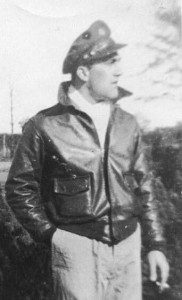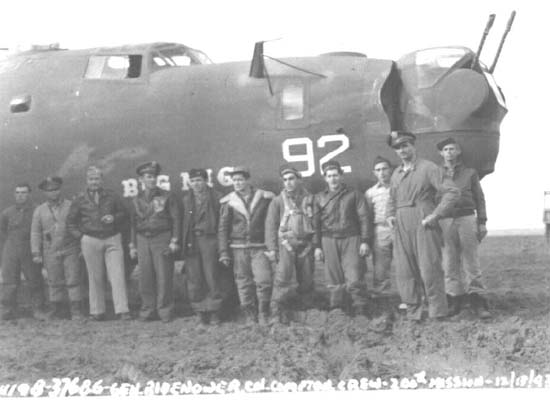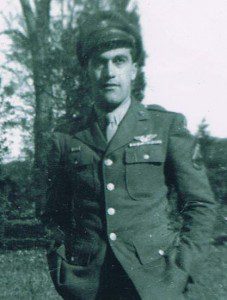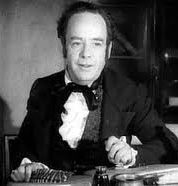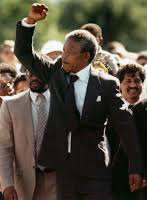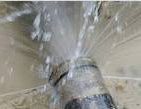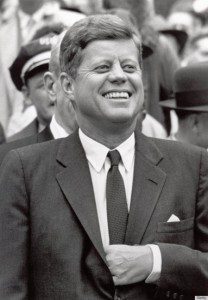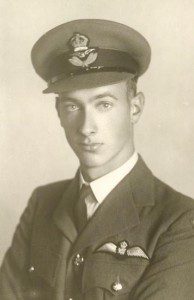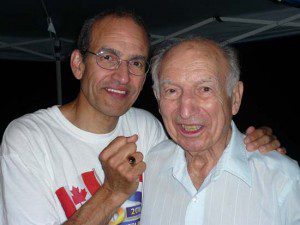
I crawled into my uncle’s spacious car. There was enough room in that Cadillac for me to stretch out and go to sleep. And, believe me, after pulling a double shift – all the previous day and the night that had just ended – both my uncle (the restaurant manager) and I (a lowly busboy) were ready to pass out. He knew I was feeling pretty exhausted and kind of unappreciated. The sky around us was brightening, just before sun-up, when he broke the silence.
“Did you hear it?” Uncle Angelo asked.
“Hear what?” I said, but since he now had my attention, I started looking around the car and out across the landscape. The sun was just peeking over the horizon.
“There!” he said, jabbing at the sky. “It’s the crack of dawn!”
I turned and looked at him as if he had lost his marbles. And as only my Uncle Angelo could do, his face was consumed by an ear-to-ear grin. He’d successfully distracted me from my self-pity. He’d perked me up from my nearly comatose state. But best of all, as far as he was concerned, he’d gotten me to walk right into one of his favourite corny jokes. We both laughed and he continued to drive home so we really could get some sleep.
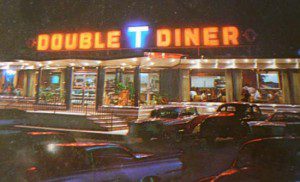
That was the summer of 1965, the year Uncle Angelo and Aunt Virginia invited me to Baltimore on my summer holidays to work in their diner, to enjoy my days off with the Maryland branch of the family and to earn a few dollars of spending money. Though he was my mother’s sister’s husband, Uncle Angelo that summer became my boss, sometimes my taxi ride home from the diner and by circumstance my surrogate father.
As a busboy in his Double T Diner, I learned how to clean and set a table in less than a minute. I learned how to collaborate with waitresses, cooks and dishwashers. And I learned the true meaning of customer service… all from my uncle.
Angelo Nopulos died this week in his beloved Baltimore at age 98. But for me he lives on in a library of personal memories. I’ll never forget his handshake – strongest of any man 30 years my senior. I’ll always remember his shoes (leather worn from honest work) and his walk (a gait that had economy and purpose). I can close my eyes now and see his firm hand on every aspect of that diner, his loyalty to his customers and his dedication to the concept of working 24/7 before the phrase was invented.
One favourite memory of my Uncle Angelo goes back to the summer of 1967, when all of North America was buzzing about the final episode of “The Fugitive.” That’s the TV serial that featured Dr. Richard Kimble (David Janssen) who was wrongly convicted of murdering his wife. For four seasons, Kimble chased the notorious one-armed man, the real killer of poor Mrs. Kimble and fled from relentless Det. Phil Gerard (Canadian actor Barry Morse). Anyway, it all concluded on air on the night of August 29, 1967.
For my family – all dedicated “Fugitive” fans – there emerged a real dilemma. That night of all TV nights fell on an occasion when my entire extended family – about a dozen of us – found ourselves at a relatively remote country location, with no cable, no colour, in fact, only an eight-inch black-and-white TV set (supplied by Uncle Angelo) and a set of rabbit ears; for the uninitiated, an antenna was required to receive the TV signal from Buffalo, N.Y.
What became apparent was that TV reception was going to be dicey. Somebody would have to stand and continuously adjust the rabbit ears as the vagaries of late ’60s evening TV transmission from Buffalo affected our viewing that night. Uncle Angelo volunteered to be the designated rabbit-ear-holder, standing behind the set and adjusting his positioning of the rabbit ears every time the signal seemed to fade, ghost or get lost in snowy static.
“Hold it there!” and “Higher, to the right!” we would all shout.
My poor Uncle Angelo probably felt as beleaguered Dr. Kimble that night of his deliverance. (By the way, Gerard caught Kimble, but Kimble caught the one-armed man and was exonerated). But how, you might ask, did Uncle Angelo – standing behind the TV set adjusting the rabbit ears – see the show? Well, one of us seated in front, held a mirror at just the right angle for him to watch the show at the same time. No surprise. Uncle Angelo never complained. It was always his nature to give pleasure to others.
By the way, as quiet a man as my Uncle Angelo generally was among a family of talkers and quipsters, each morning he drove me home from the Double T Diner that summer of 1965, he offered me his unique formula for people like himself who needed 10 hours’ rest in less than six hours of night available.
“Sleep fast,” Angelo would say, “and you’ll wake up raring to go.”
I’ll always try, Uncle. But I’ll never be as good at it as you.
